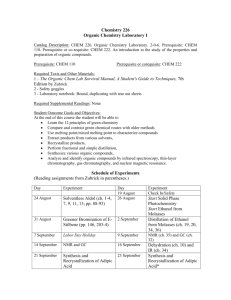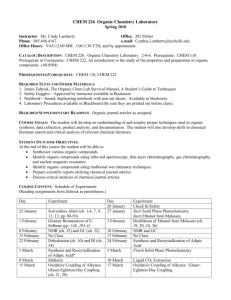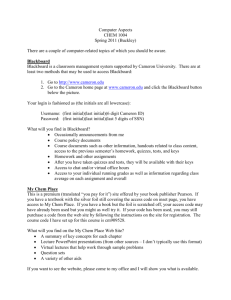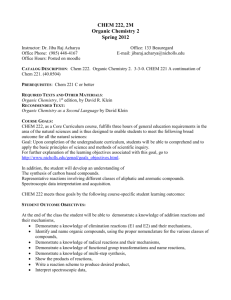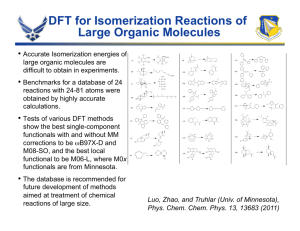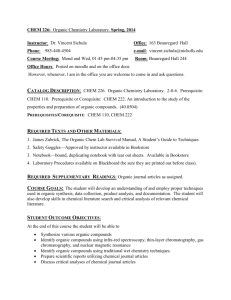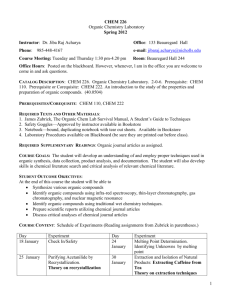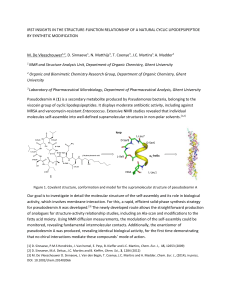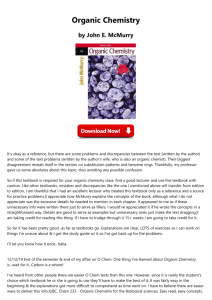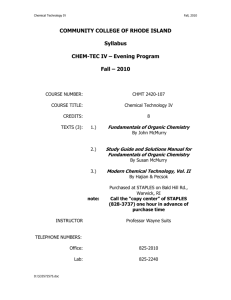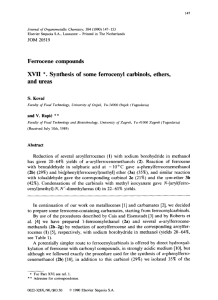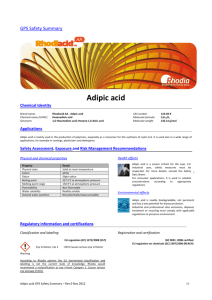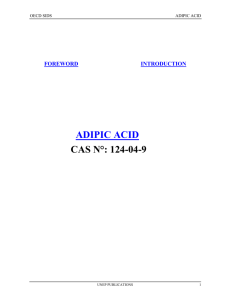Chemistry 226 - Nicholls State University
advertisement
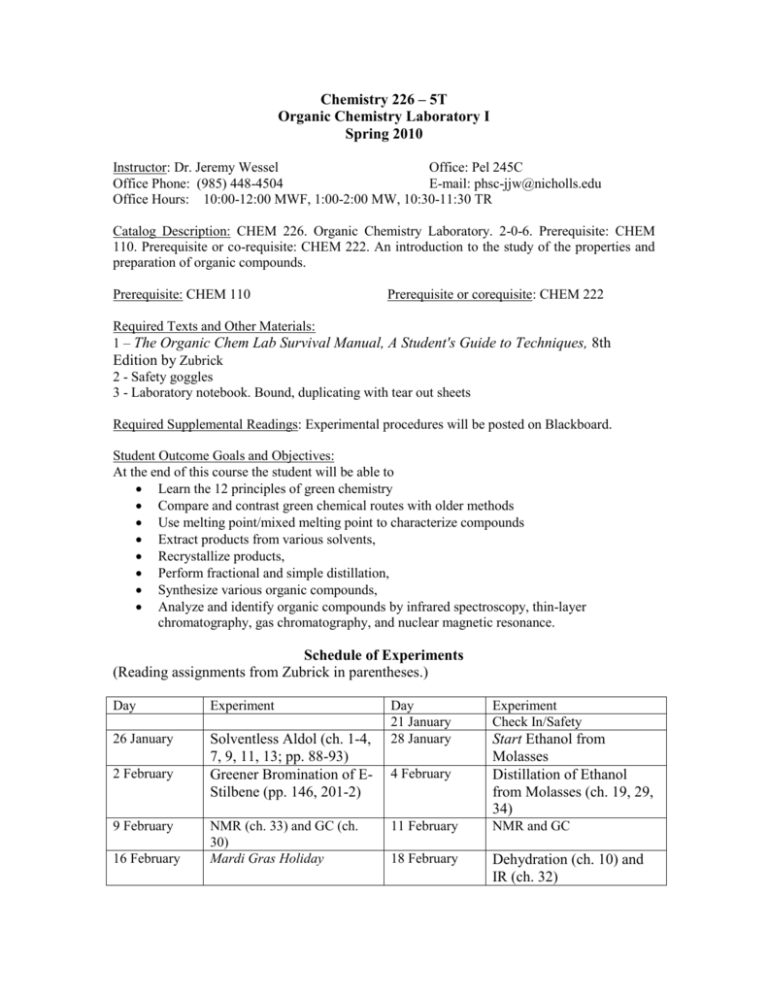
Chemistry 226 – 5T Organic Chemistry Laboratory I Spring 2010 Instructor: Dr. Jeremy Wessel Office: Pel 245C Office Phone: (985) 448-4504 E-mail: phsc-jjw@nicholls.edu Office Hours: 10:00-12:00 MWF, 1:00-2:00 MW, 10:30-11:30 TR Catalog Description: CHEM 226. Organic Chemistry Laboratory. 2-0-6. Prerequisite: CHEM 110. Prerequisite or co-requisite: CHEM 222. An introduction to the study of the properties and preparation of organic compounds. Prerequisite: CHEM 110 Prerequisite or corequisite: CHEM 222 Required Texts and Other Materials: 1 – The Organic Chem Lab Survival Manual, A Student's Guide to Techniques, 8th Edition by Zubrick 2 - Safety goggles 3 - Laboratory notebook. Bound, duplicating with tear out sheets Required Supplemental Readings: Experimental procedures will be posted on Blackboard. Student Outcome Goals and Objectives: At the end of this course the student will be able to Learn the 12 principles of green chemistry Compare and contrast green chemical routes with older methods Use melting point/mixed melting point to characterize compounds Extract products from various solvents, Recrystallize products, Perform fractional and simple distillation, Synthesize various organic compounds, Analyze and identify organic compounds by infrared spectroscopy, thin-layer chromatography, gas chromatography, and nuclear magnetic resonance. Schedule of Experiments (Reading assignments from Zubrick in parentheses.) Day Experiment 26 January Solventless Aldol (ch. 1-4, 7, 9, 11, 13; pp. 88-93) Greener Bromination of EStilbene (pp. 146, 201-2) 2 February 9 February 16 February NMR (ch. 33) and GC (ch. 30) Mardi Gras Holiday Day 21 January 28 January Experiment Check In/Safety 4 February Start Ethanol from Molasses Distillation of Ethanol from Molasses (ch. 19, 29, 34) 11 February NMR and GC 18 February Dehydration (ch. 10) and IR (ch. 32) 23 February 2 March 9 March 16 March 23 March 30 March 6 April 13 April 20 April 27 April 4 May Synthesis and Recrystallization of Adipic Acid Start Solid Phase Photochemistry 25 February Synthesis and Recrystallization of Adipic Acid* 4 March Review Midterm 11 March 18 March Liquid CO2 Extraction Oxidative Coupling of Alkynes: Glaser-EglintonHay Coupling Friedel-Crafts Reaction: Acetylation of Ferrocene* Oxidative Coupling of Alkynes: Glaser-EglintonHay Coupling (ch. 21, 27) Friedel-Crafts Reaction: Acetylation of Ferrocene Electrophilic Aromatic Iodination Spring Vacation Biodiesel Microwave Synthesis of 5,10,15,20Tetraphenylporphyrin Combinatorial Chemistry2 25 March 1 April 8 April 15 April 22 April 29 April Finish Solid Phase Photochemistry Spring Vacation Microwave Synthesis of 5,10,15,20Tetraphenylporphyrin (ch. 28) Nucleophilic Substitution of Fabric Dyes1 Review Final Course Content: 1freshly washed 100% cotton material or T-shirt required by each student 2 samples require 24 hours incubation so each student will be required to return the next day (not class day) to view the plates Method of Evaluation: All students will perform experiments using proper safety practices. Notebook: 25 points/experiment 14 experiments 350 points *Formal reports on adipic acid, acetylferrocene (50 pts. each) 100 pts Midterm Exam 100 points Final Exam 100 points 650 points Grades will be determined using the following scale: A: 90-100 B: 80-90 C: 70-80 D: 60-70 F: <60 Academic Dishonesty Policy: Any student found cheating will be subject to the penalties stated in Student Code of Conduct; including, but not limited to, a score of zero on exam, expulsion from the class, or expulsion from the University. Attendance Policy: Attendance is mandatory. Make-up Policy: Missed labs can be made up for an excused absence. Make-ups must be completed within two weeks of the experiment date. Academic Disabilities Policy: If you have a documented disability that requires assistance, you will need to register with the Office of Disability Services for coordination of your academic accommodations. The Office of Disability Services is located in Peltier Hall, Room 100-A. The phone number is (985) 448-4430 (TDD 449-7002). Academic Grievances: The proper procedure for filing grade appeals or grievances related to academic matters is listed in Section 5 of the Code of Student Conduct and at the following link: http://www.nicholls.edu/documents/student_life/code_of_conduct.pdf. Continued Learning following an Extreme Emergency The following guidelines are meant: to help the business of education continue at Nicholls State University in the aftermath of an extreme emergency situation; to help faculty and students understand their roles in completing education requirements for courses in progress when the emergency began; and to encourage faculty to be imaginative and resourceful in finding ways to continue the education of students and the work of the university. Faculty responsibilities: • Faculty members are responsible for their development in the use of the Blackboard (or designated) software. • Faculty members are responsible for having a plan for continuing their courses using only Blackboard and email. • Faculty members should be allowed to continue their course in whatever way suits the completion of the course best, and encouraged to be creative in the continuation of these courses. • Any adjustments or compensations made to a student’s progress in special programs with labs, clinical sequences (i.e. Culinary, Nursing, etc.), or the like should be made only in the immediate semester following the emergency. Faculty members are responsible for including these guidelines in all syllabi. Student responsibilities: • Students are responsible for reading regular emergency notifications on the NSU website. • Students are responsible for knowing how to use and access Blackboard. • Students are responsible for being familiar with emergency guidelines. • Students are responsible for evacuating textbooks and other course materials. • Students are responsible for knowing their Blackboard login and password • Students are responsible for contacting faculty regarding their intentions for completing the course. NOTE: Faculty and students should be open, flexible, and show compassion in determining the precise course of action. Semester Withdrawals: The last day to withdraw from the class with a ‘W’ is March 31, 2010. Class Disruptions: The use of cellular phones, pagers or any other electronic personal device is prohibited in class. Any infractions will result in dismissal from class and 0 for the experiment. DISCLAIMER. This syllabus is not a contract and no part of it should be construed as such. The syllabus is subject to change. Students will be notified of these changes in a timely manner.
